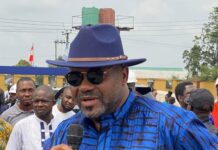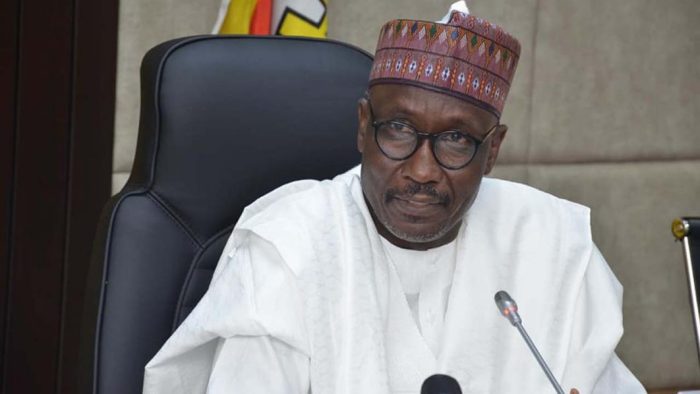 In its relentless efforts to end the Boko Haram insurgency, the Presidency has constituted a body, the Presidential Committee on Dialogue and Peaceful Resolution of Security Challenges in the North. The decision followed the consideration of the report of the technical committee commissioned by the government to review fresh ways of addressing security challenges in the North. The 26-member Committee, headed by Kabiru Turaki, the Minister of Special Duties, is saddled with the responsibility of engaging members of Boko Haram in dialogue and designing a framework for resolving the violence precipitated by them.
In its relentless efforts to end the Boko Haram insurgency, the Presidency has constituted a body, the Presidential Committee on Dialogue and Peaceful Resolution of Security Challenges in the North. The decision followed the consideration of the report of the technical committee commissioned by the government to review fresh ways of addressing security challenges in the North. The 26-member Committee, headed by Kabiru Turaki, the Minister of Special Duties, is saddled with the responsibility of engaging members of Boko Haram in dialogue and designing a framework for resolving the violence precipitated by them.
Unfortunately, two members of the Committee have declined their membership. They are Shehu Sani, social activist and the Executive Director of the Civil Rights Congress, and Datti Ahmed, the President of the Supreme Council for Sharia in Nigeria. Sani turned down his membership on the grounds that he was neither consulted nor informed by the Presidency before the announcement of his membership was made. On his own part, Ahmed, a medical doctor, said he
rejected membership of the committee because of the bitter experience he had with the government in 2012, when he voluntarily tried to mediate between the authorities and members of the violent Islamic sect.
Alleging insincerity on the part of the government, Ahmed said the composition of the amnesty committee was faulty. He argued that the chairman of the panel, as well as the secretary, who are nominees of the federal government would always tell the government what it wanted to hear and not the truth. “The minister and secretary will tell lies to the government and we would be left quarrelling with young Nigerians, young enough to be our children.”
//////////////////////////
‘Human capacity development is one sure way to right the perceived wrongs wrought on the North by successive Northern governments’
////////////////////////
Datti said he previously made such moves twice and that it was not the government that asked him to do so. “We had reached a stage where, had the government agreed with what we resolved with the sect members, by now, we would have forgotten everything. Nigeria would have witnessed peace by now,” Ahmed said. “From past experience, the government was not sincere and it did everything to ensure that the earlier talk failed. It was just like we were going to have a peaceful resolution the next day, and what the government should have done was not something difficult. It was just for them to release their (Boko Haram members) wives, reduce tension in Yobe and Borno states, and stop persecuting the people there. The government said it was going to do that but it did not. It is the same government that wants to do that now.”
Boko Haram had, in March 2012, picked Ahmed as a mediator between it and the federal
government. At that time, it said his choice was based on the fact that its former leader, the late Mohammed Yusuf, served as a member that represented Borno State in the Council of Sharia in Nigeria. But a few days later, Ahmed pulled out of the process after details of the discussions appeared in the media.
Though the government seems not to be perturbed about the two members’ withdrawals, I am
quite sure the decline of Ahmed to serve in this committee has dealt it a ‘ballistic’ blow. The first is that although nobody is indispensable, Ahmed definitely wields a lot of influence both in the northern part of the country and Nigeria as a whole. In my days in TELL magazine, 1991-2004, he was a fearless critic of whatever he perceived to be wrong with the government of the day without mincing words. No wonder reporters naturally flock around him to extract words
or interviews from him. He is widely respected and loved by his people.
For such a man with high level of credibility and with whom a lot of trust is reposed, even by the Boko Haram sect, to have pulled out of the committee means that the 26-member committee has a long, difficult and tortuous road to travel in the discharge of its mandate. There is no doubt that there are still many members of the committee who are eminently qualified in their own right to be on board, but a person like Ahmed is very vital and may be key to an effective interface
with the dreaded sect members. Don’t forget that he had earlier voluntarily interfaced
with some members of the sect in the past. So, to me, it was like a right step in the right direction for government to have thought it wise enough to include him in the committee.
But now, the bubble has burst. How far can the committee go in establishing trust between
the government and members of the sect before any meaningful modality towards a peaceful and amicable solution can be found to the lingering impasse which has claimed several innocent lives and property? It is only hoped that no other member drops out any longer. Otherwise, it may seem that this committee itself needs ‘amnesty’ to put it on a good footing.
In my discussion with a friend in the United States last week in the wake of the announcement of the composition of the Committee, my friend, a Nigerian professor, said that the membership list did not include anybody from the South-South geopolitical zone of the country. He pointed out that it was an unpardonable error. For one, amnesty has worked or seems to be working in that part of the country. It is believed that it is that workability of the amnesty programme in the Niger Delta that may have goaded people to start the clamour for amnesty for Boko Haram. Therefore, ignoring or the omission of such an integral part of the amnesty programme by the Presidency cannot by any yardstick be justified.
It is only normal that people with experience on amnesty be included so as to give the
committee a good boost. Now, not even a soul from either the South-South or anybody with background experience on the ongoing amnesty programme in the Niger Delta has been included in the 26-member list. It gives an impression that the President has no input in most of these committees except that people just cook up the lists and bring them to him for his assent from time to time. This is not good enough for the image of the President himself. Besides, many people also believe the membership is unwieldy. To them, perhaps, a seven, nine, 11 or 13- member committee would have just been it.
There are several names in the South-South that could have conveniently made the list.
There is Annkio Briggs, a known Niger Delta activist; Timi Alaibe, the immediate past Special Adviser to the President on Amnesty is there, so also is Kingsley Kuku, the incumbent Special Adviser to the President on Amnesty and Alaibe’s successor. There are also those who have been toiling day and night to make the Niger Delta Amnesty Programme work. One of them is Chibuzor Ugwoha, the immediate past managing director of the Niger Delta Development Commission, NDDC. He is an incurable believer in due process and the rule of law who has
been passionately championing the process of human capacity development. The products of his human capacity crusades as the boss of the NDDC are there for everybody to see. The people whose lives he touched by his programmes while in office are proud of him and are able to raise their heads everywhere in the world today. Human capacity development is one sure way to right the perceived wrongs wrought on the North by successive northern governments.
With the amnesty committee in place, the country seems to have moved towards enthroning
peace in the North, which, by extension, should extend to every nook and cranny of the entire country where banditry now reigns supreme. One sure way to do this is by properly identifying the root cause or causes of the disaffection in all corners of the society. The fact remains that we cannot continue with all the plethora of crises – violent robbery, pipeline vandalism, Boko Haram, kidnapping for ransom, and all that.



